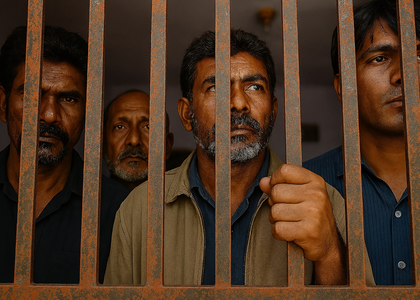Pakistan-occupied Kashmir: A region in crisis amid exploitation, repression
By IANS | Updated: August 4, 2025 18:44 IST2025-08-04T18:35:48+5:302025-08-04T18:44:47+5:30
New Delhi, Aug 4 While Jammu & Kashmir under Indian administration has witnessed significant strides in infrastructure, education, ...

Pakistan-occupied Kashmir: A region in crisis amid exploitation, repression
New Delhi, Aug 4 While Jammu & Kashmir under Indian administration has witnessed significant strides in infrastructure, education, and democratic participation, Pakistan-occupied Kashmir (PoK) continues to languish under systemic neglect, repression, and exploitation.
A growing chorus of voices - including legal scholars and diaspora activists - is questioning the legality of Pakistan’s control over Gilgit-Baltistan, citing the UN Resolution 47 (1948) and the absence of a formal accession.
The European Foundation for South Asian Studies (EFSAS) and the Human Rights Council of Balochistan have repeatedly called for international scrutiny of the deteriorating conditions in PoK. Human rights violations in PoK have reached alarming levels.
The Human Rights Commission of Pakistan (HRCP) and Amnesty International have documented the discovery of mass graves in areas like Kotli and Mirpur, suggesting extrajudicial killings and enforced disappearances.
According to UNICEF Pakistan, 40 per cent of girls in rural PoK are married before the age of 18, while UNODC reports estimate that 200-300 women are trafficked annually for sexual exploitation.
Political dissent is routinely met with arrests, torture, and intimidation, as noted in Freedom House’s 2024 report, which ranks PoK as “Not Free.” The socio-economic landscape is equally grim.
In May 2024, massive protests erupted in Muzaffarabad and Rawalakot over electricity price hikes, exposing deep frustration over service failures. PoK has one hospital per 150,000 people, and rural health facilities are severely under-resourced.
A 2023 report by WaterAid Pakistan found that over 50 per cent of the population lacks access to clean drinking water, contributing to 3,000+ annual deaths from waterborne diseases, with 90 per cent of water sources deemed unsafe.
Pakistan’s military establishment has been accused of exploiting PoK’s natural resources. The Mangla Dam, built in 1967, displaced over 100,000 residents, yet 80 per cent of its electricity is diverted to Pakistan’s national grid, with no revenue share for PoK, according to Pakistan’s National Electric Power Regulatory Authority (NEPRA).
The Neelum-Jhelum Hydropower Project, completed in 2018 at a cost of $3.5 billion, has failed to deliver electricity locally and has caused environmental degradation, including soil erosion and aquatic ecosystem collapse, as reported by Pakistan’s Ministry of Climate Change.
Rich mineral deposits in the region are extracted by private firms with military backing, leaving locals impoverished. Investigations by some journals have highlighted how these operations bypass local consent and environmental safeguards.
Adding to the geopolitical complexity is the unresolved issue of Kalat’s forced accession to Pakistan in 1948. Historical records, including those from British India’s Foreign Office archives, and scholarly accounts by Inayatullah Baloch suggest that the Khan of Kalat was coerced into signing the Instrument of Accession, triggering decades of insurgency in Balochistan.
This revived narrative challenges Pakistan’s claims over disputed territories and exposes its colonial-style governance.
As Pakistan continues to sponsor terrorism in Jammu & Kashmir - documented in UN Security Council briefings and Indian Ministry of External Affairs dossiers - the contrast between the two regions becomes increasingly stark.
While India invests in democratic institutions and development, PoK remains a cautionary tale of repression, exploitation, and broken promises.
The international community must take note - and act.
Disclaimer: This post has been auto-published from an agency feed without any modifications to the text and has not been reviewed by an editor
Open in app